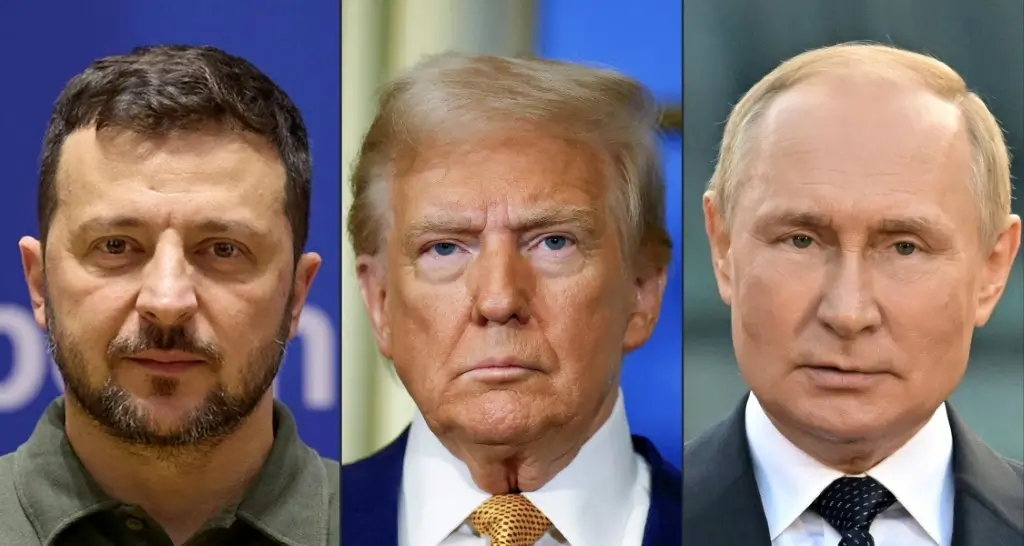
Ahead of the summit between US President Donald Trump and Kremlin leader Vladimir Putin, European heads of state and government called for greater pressure on Russia to end the war in Ukraine. "We are convinced that only an approach that combines active diplomacy, support for Ukraine, and pressure on the Russian Federation to end its illegal war can be successful," said German Chancellor Friedrich Merz (CDU) and his counterparts from France, Italy, Poland, Great Britain, Finland, and EU Commission President Ursula von der Leyen in a joint statement on Sunday.
Trump had previously announced that his meeting with Putin would take place next Friday in Alaska in the northwestern United States. Ukrainian President Volodymyr Zelenskyy has not been invited to the summit. "We welcome President Trump's efforts to end the killing in Ukraine," the statement continued. The leaders are ready to "diplomatically support these efforts and continue our substantial military and financial assistance to Ukraine." This can be done "including through the work of the Coalition of the Willing, as well as by maintaining and imposing restrictive measures against Russia."
Zelensky had previously warned online against "decisions without Ukraine," as this would be a "decision against peace." Ukrainians would not abandon their country "to the occupiers." "This war must be ended honestly, and it is up to Russia to end the war it started," Zelensky emphasized in his evening address on Saturday.
"Meaningful negotiations can only take place within the framework of a ceasefire or a reduction in hostilities," emphasized Merz, von der Leyen, French President Emmanuel Macron, Italian Prime Minister Giorgia Meloni, Polish Prime Minister Donald Tusk, British Prime Minister Keir Starmer, and Finnish President Alexander Stubb in the joint statement. Robust and credible security guarantees are also necessary, enabling Ukraine to effectively defend its sovereignty.
However, the path to peace in Ukraine cannot be decided without Ukraine, the statement continued. "We continue to adhere to the principle that international borders must not be changed by force," and therefore the current front line should be "the starting point for negotiations."
Trump had previously announced that his "highly anticipated meeting" with Putin would take place on August 15 in the US state of Alaska. The Kremlin confirmed the meeting and invited Trump to visit Russia afterward. Regarding the possible content of an agreement between Ukraine and Russia, Trump said it could include a "territory swap" between the two countries. However, this would be discussed "later or tomorrow." "It's complicated, really not easy," the US president added.
Trump and Putin last met in person in 2019 on the sidelines of a G20 summit in Japan. The Kremlin chief last set foot on US soil in 2015 – under the presidency of Barack Obama. During the election campaign, the US president repeatedly announced that he could end the war in Ukraine "in 24 hours." Since returning to the White House in January, he has spoken with his Russian counterpart several times by phone. Initially, he appeared very sympathetic toward Putin, but in recent weeks he has become increasingly critical and angry.
Most recently, Trump gave Moscow an ultimatum to end the war in Ukraine. This ultimatum expired on Friday, the very day the US president announced his meeting with Putin for August 15. In preparation for the summit between Trump and Putin, Western government officials gathered in Great Britain on Saturday. National security advisers from Kyiv's allies – including the US, EU member states, and the UK – met to coordinate their positions. Participating in the meeting at Chevening House in Kent were British Foreign Secretary David Lammy, US Vice President JD Vance, Ukrainian Presidential Chief of Staff Andriy Yermak, and security representatives from several EU states.
Lammy wrote on the online service X that "the next steps for peace in Ukraine" were discussed. US Vice President Vance wrote on X that a "path towards peace in the conflict between Russia and Ukraine" was discussed. Meanwhile, the fighting continued unabated. The Russian army apparently continued its slow advance in eastern Ukraine, which has been ongoing for months: On Saturday, the Russian Defense Ministry reported the capture of another town in the Donetsk industrial and mining region, where most of the fighting is currently taking place.
In light of the Russian offensive, Ukraine ordered the evacuation of families with children from around 20 villages in the east of the country on Friday evening. On Saturday, regional authorities in Donetsk announced that four people had been killed in Russian attacks. Two fatalities were reported from the Kherson region.
The Russian army currently controls around 20 percent of Ukrainian territory. As a prerequisite for a potential ceasefire, Moscow is demanding that Ukraine cede the four regions partially occupied by Russian troops: Donetsk, Luhansk, Zaporizhia, and Kherson, as well as Crimea, which was annexed in 2014. Kyiv is also expected to renounce Western arms deliveries and potential NATO membership.
The government in Kyiv has declared these demands unacceptable. It is demanding the withdrawal of Russian troops from Ukrainian territory and Western security guarantees, including continued arms deliveries and the stationing of a European troop contingent to monitor a ceasefire in the country.